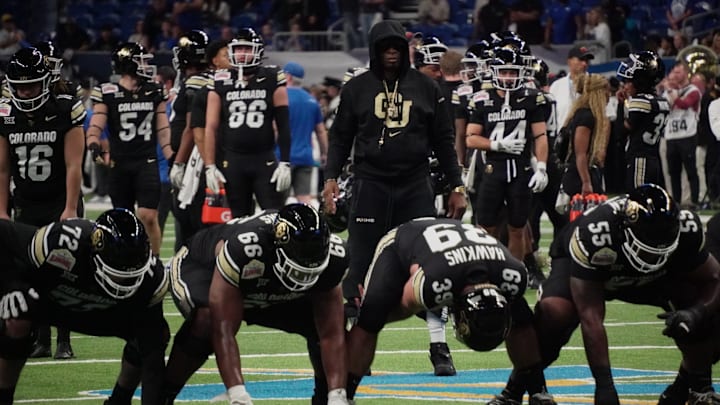Colorado and others are on verge of seismic NIL changes. What comes next?

In this story:
A legend who never played a down for the Buffs passed recently just shy of his 90th birthday. A herd of long-time University of Colorado players, coaches and administrators gathered to pay last respects to Bob Litchard.
“Litch” was beloved. A rugged college athlete, NFL veteran, college coach and prolific fundraiser played a huge role in the creation of the Dal Ward Center at Folsom Field and the UCHealth Anschutz Medical Campus. A major gifts superstar, the New York native served several CU presidents. The dude could raise money.
A gregarious guy. Always with a smile on his face, often a beverage in hand and humorous jokes flowing from his lips. Your scribe and Litch became buddies through flying on the CU football team plane during days as the “Buff Guy” for KCNC-TV in Denver. Then known as “Home of the Buffs.”
Most in attendance were old and no longer closely associated with the athletic program. Nonetheless, shoulder to shoulder Buffs to the bone. However, one person was present who maintains close ties to Coach Prime’s band of buffaloes. Wouldn’t you know? Folks in the final quarter of life, with less filters these days, bombarded our insider with many direct questions.
Number one came from a long-time booster who over the years has donated significant money to CU athletics. John Dikeou goes back to Eddie Crowder, Fred Casotti and the hiring of Bill McCartney. The fervent fan asked what was on every mind.
“How can the Buffs compete financially moving forward against the powerhouse programs?” Sincerely, without skipping a beat the source responded. “How can we compete? It’s pretty simple. NCAA and television money.”
The current season is down to the final four. As college football moves beyond the powerhouse quartet vying for national supremacy and toward the 2025 season? An expected California court ruling will alter the landscape dramatically starting July 1, 2025. That’s when universities like Colorado can begin to share an estimated $20 million/season with their athletes. Revenue sharing and the realization of professionalism after the $2 billion-settlement of “House vs the NCAA.”
“We can compete thanks to the $20 million we are getting each year from the settlement,” the source offered. The money must be spread throughout CU’s athletic sports programs. However, the bulk will go toward the revenue generators: men’s football and basketball.
It gets even better. The annual payout will rise to $30 million over the next decade. Throw in the television contracts running a similar time frame? Resources are plentiful. The source’s words soothed the souls of gray-haired Buff faithful.
Nike sets release date for Deion Sanders' signature Diamond Turf original
But your scribe is not certain. Every university and their athletes will benefit from the NCAA’s years of greediness. Not sharing the wealth is costing the Indianapolis-based organization an incredible amount of money and continues its decline as the organizing body supervising collegiate athletics.
Here’s the concern. While athletic departments from sea to shining sea will see a boost in revenue? It will not erase a clear and present danger: Collectives. Well-heeled financial programs - Texas, Georgia, Notre Dame, Ohio State and Oregon to name a handful - through collectives have unlimited NIL possibilities for outstanding players.
The House settlement requires a third-party operator to approve all significant NIL deals from school-affiliated entities, or collectives. That’s why programs are hiring “General Managers” to coordinate distribution of funds. There’s still plenty of unknowns. The intent is to sunset the collectives but many fear zealous boosters will find work arounds.
Deion Sanders received 'multiple threats' before last year's Rocky Mountain Showdown
In other words, all schools benefit from House and television revenues but it’s not going to eliminate the sobering reality some schools have financial heavyweights with unlimited wealth. We know money talks.
The Litchard memorial service CU source shrugged shoulders in acknowledging the influence of collectives. It hurts less for the Buffs considering a growing national presence since Coach Prime arrived at the foot of the Flatirons.
The Buffs might be currently okay but the waters ahead look choppy. Leaders of college football must figure out a way to reign in mega donors. Nike founder and Oregon booster Phil Knight - an example.
I can hear Litch snorting, “Good luck, the genie’s out of the bottle.”

Mark McIntosh covered the Buffs as a sports broadcaster for KCNC-TV during the glory years of Colorado football from the late 1980’s through 2006. He also hosted the television coaches' shows of Bill McCartney, Rick Neuheisel, and Gary Barnett during that time frame. McIntosh is an author, motivational speaker and encourages others to persevere despite life’s challenges. The father of two is an advocate for equity in education and helping displaced men build a stronger cord to their families, purpose and communities. The Missouri native also suffers from a rare bone marrow disease, Amyloidosis, and advocates for earlier detection of the incurable disease that attacks vital organs like the kidneys, heart, lungs, and liver.